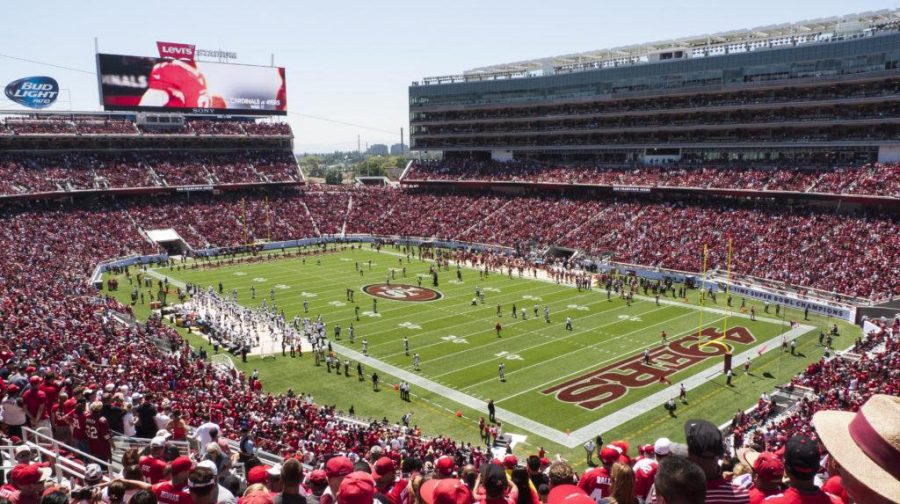There is little that needs to be done to anger and upset the average American. Most of the time it doesn’t even require doing something obscene, destructive or violent. No, in this country, even performing symbolic gestures is enough to rally the masses to call for your deportation.
San Francisco 49ers quarterback Colin Kaepernick learned this the hard way when he refused to stand for the national anthem during a preseason game. He was protesting the treatment of African Americans and other minorities by law enforcement.
“I am not going to stand up to show pride in a flag for a country that oppresses black people and people of color,” Kaepernick said in a post-game interview. “To me, this is bigger than football and it would be selfish on my part to look the other way. There are bodies in the street and people getting paid leave and getting away with murder.”
Since the incident, Kaepernick has received an onslaught of criticism and condemnation. He was met with boos and yells when he took to the field the following game. “Maybe he should find a country that works better for him,” said presidential candidate Donald Trump.
Others used Kaepernick’s actions as an excuse to take jabs at the broader black community. “When will those in black communities take a step back and take some responsi-damn-bility for the problems in black communities,” Tomi Lahren of The Blaze said, “because it seems to me, blaming white people for all your problems might make you the racist.”
It’s astonishing that the very same individuals who bicker endlessly about political correctness are unable to contain themselves when an athlete takes a stand against a perceived injustice in society. Harass or throw racial slurs at someone on the internet and it’s called exercising freedom of speech. Make an inflammatory remark about someone’s gender or sexual orientation and dissenters are just too sensitive. Refuse to stand for the national anthem? Get out of the country. This toes the line between hypocrisy and outright contradiction.
Kaepernick’s actions were justified. I’ll begin by saying that what he did amounts to a political statement protected by the first amendment. I have yet to come across anyone who denies this. Even those who condemn Kaepernick concede that he had a constitutional right to do what he did. However, they follow it up with something like, “well, soldiers died for his right to do so, and, by refusing to stand, he is disrespecting them and should find a new place to live.” We’ve all heard this argument before. Sure, you have a right to burn the flag, or to not say the pledge, or to remain kneeling during the national anthem — but not really. As historian and U.S.-enthusiast Marc Leepson put it, “If you exercise your right to Freedom of Speech by disrespecting [the flag or national anthem], you do so at your own peril.”
Is this really free speech? If you cannot say or do something without receiving threats of violence or having people call for you to leave the country, are you really free to speak up or act out? This seems like free speech with a consequential caveat: namely, that if you exercise it in a way that insults the traditions of this country, you’ll be invited to find a new place to live. This is a rather loose definition of freedom.
Criticizing structural inequality or the treatment of particular groups in this country is both legitimate and necessary. After countless videos of unarmed people of color being shot or killed by the police, and multiple reports confirming racial bias in police departments in America, Kaepernick’s actions shouldn’t be surprising. Rather than chastising him, we should be applauding him for looking past his status as an NFL player and seeing himself as just another person of color living in America.
This is not, at least not entirely, about someone sitting during the national anthem. It is also about the inability of many to admit that racial discrepancies still exist in this country, and their tendency to freak out when anyone points this out. When people of color protest peacefully, they are often called lazy and told to get jobs. When a protest turns violent, they are called thugs and told they are reaffirming stereotypes. And when a black athlete uses his platform to speak out against a societal issue, he is called “bud” and a “crybaby” and told to be more grateful. “Didn’t two white parents adopt you after yours weren’t willing to raise you?” Lahren rhetorically asked Kaepernick in her Blaze broadcast.
The reaction of Lahren and others highlights the reality that, for many, conversations about race invoke defensiveness and feelings of frustration. We need to find a way to get past this. There are well-documented, ongoing injustices in this country that need to be addressed — even if it makes some people uncomfortable. In the meantime, we will have to deal with professional athletes exercising their first amendment rights through peaceful protest.
letters@chronicle.utah.edu


